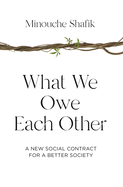
There might be a paradigm of individualism and independence in the contemporary world, but as London School of Economics director Minouche Shafik points out, moments of crisis such as the global Covid-19 pandemic make apparent how societies are still very much intertwined and interdependent. These crises also present distinct opportunities to remake the world.
In What We Owe Each Other, Shafik presents a compelling argument to reemphasize the idea of the social contract, as was done with the New Deal after the Great Depression, and reinvent it to fit modern challenges. She begins by defining the "social contract" as a way of spreading risk more evenly across society to lead to better opportunities for all, and offering statistics that demonstrate how care for all actually leads to better GDP, anticipating and countering arguments against the expansion of the so-called welfare state. Shafik examines how remaking the social contract with regards to children, education, health, work, old age and generations can lead to a rebalancing of resources, focusing on economic arguments. By doing so, she offers her version of a new social contract, one that rests on the idea of "guaranteed basics for a decent life to which everyone is entitled" and provides the roadmap to execute such an idea. What We Owe Each Other is a persuasive look at current fiscal policies and practices, and how they might be altered to meet the needs of a changing society. --Michelle Anya Anjirbag, freelance reviewer

